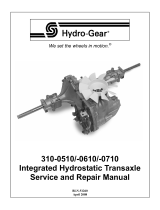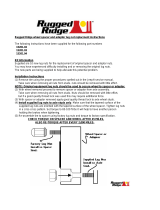
2 ZT-2800
®
/ZT-3100™/ZT-3400™
drives’ cool, quiet operation. An external lter on
the transaxle allows for easy oil maintenance.
The ZT-2800 is designed for both charged and
uncharged product versions. In the uncharged
consumer vehicle drive, uid passes through
the lter by interaction of the positive head on
the uid from a properly elevated expansion
tank and the negative pressure created at the
pump inlet during piston operation.
Hydro-Gear’s patented charge conguration
is used in the ZT-3100 and ZT-3400 version.
Here, uid is drawn from the case and through
the lter and into a xed displacement gerotor
pump. Charge pump ow not used to feed the
low pressure side of the system is passed over
a charge relief valve and back into the transaxle
case.
The check valves in the center section are used
to control the make-up ow of the uid to the
low pressure side of the loop.
The ZT-2800, ZT-3100 and ZT-3400 have an
internal cog style parking brake. It is essential to
fully disengage the brake prior to operation.
A cam style, block lifting bypass is utilized in
the ZT-2800, ZT-3100 and ZT-3400 to permit
moving the vehicle for a short distance at a
maximum of 2 m.p.h. (3.2 Km/h) without start-
ing the engine. The brake must be disengaged
prior to actuating the bypass mechanism.
WARNING
Actuating the bypass will result in the
loss of hydrostatic braking capacity. The
machine must be stationary on a level
surface and in neutral when actuating
the bypass.
Introduction
The purpose of this manual is to provide in-
formation useful in servicing the Hydro-Gear
®
ZT-2800
®
, ZT-3100™ and ZT-3400™ Integrat-
ed Zero-Turn Transaxles. This manual includes
the general descriptions, hydraulic schematics,
technical specications, servicing and trouble-
shooting procedures for both transaxles.
Other than recommended oil and lter changes,
the transaxle normally will not require servic-
ing during the life of the vehicle in which it is
installed. Should other servicing be required,
the exterior of the transaxle will need to be
thoroughly cleaned before beginning most
procedures. Do not wash the transaxle while
it is hot. Do not use a pressure washer to
clean the unit.
General Description
The ZT-2800, ZT-3100 and ZT-3400 are self
contained units designed for the transfer and
control of power. They provide an innitely vari-
able speed range between zero and maximum
in both forward and reverse modes of opera-
tion.
The ZT-2800 and ZT-3100 transaxle uses a
variable displacement pump with a maximum
displacement of 10cc per revolution. The ZT-
3400 transaxle uses a variable displacement
pump with a maximum displacement of 12cc
per revolution. Both transaxles use a motor with
a xed displacement of 16cc per revolution. The
variable displacement pump features a trunnion
mounted swashplate with a direct-proportional
displacement control. Reversing the direction
of the swashplate reverses the ow of oil from
the pump and thus reverses the direction of the
motor output rotation. The pump and motor are
of the axial piston design and utilize spherical
nosed pistons which are held against a thrust
race by internal compression springs.
Both transaxles are fully ooded with oil. A
common external expansion tank assures the
DESCRIPTION AND OPERATION






















